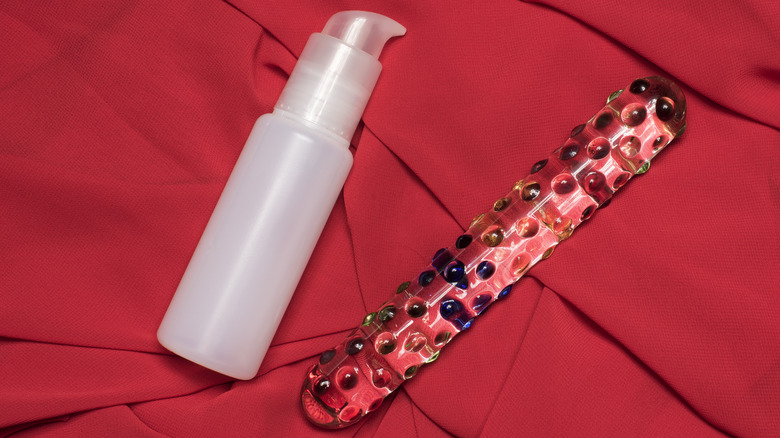How To Choose The Right Lube For Your Sex Life
The topic of personal lubricant can cause some mixed reactions. There are people who love it and use it regularly, then there are those who not only skip it, but get a bit judgmental about it. The reason being our culture falsely boasts that anyone with a vagina should be wet and ready for penetration. Of course, this isn't how bodies work.
Vaginal dryness is a real problem for some people — not just those going through perimenopause or who have completed their menopausal journey. According to The American College of Obstetricians and Gynecologists, vaginal dryness can be caused by certain medications like antihistamines and SSRIs, breastfeeding, post-childbirth hormone changes, and during cancer treatment. Vaginal dryness also happens if you're dehydrated — vaginal walls need hydration to lubricate naturally. Also, some people, no matter how aroused they are, just don't lubricate enough to have enjoyable and pain-free sex. But that doesn't mean they aren't game for a bit of penetrative pleasure.
The key to good sex, if not great sex, is lube. Even if you think you don't need it or you've fallen into the misguided belief that lube is only for people who are on the brink of menopause, shelf your judgment immediately and give it a try. Not only does it make penetrative sex — both vaginal and anal — more pleasurable, but it can up your oral sex game too. There are just a handful of things you'll want to keep in mind before making your purchase.
Decide how you're going to use it
If you've never used lube, know that there are three different kinds: water-based, silicone-based, and oil-based. Most people usually go for water-based for two reasons: it won't affect medical-grade silicone sex toys, and it's easy to clean up. Water-based lubes won't stain your sheets and, added bonus: water-based lube is gentle if you have a sensitive pH, but pay attention to additives.
Silicone-based lube, although great because it doesn't need to be reapplied as much as water-based lube, can be a bit problematic — especially if you have silicone toys. Over time silicone-based lube degrades silicone toys which, if you've invested in a silicone dildo or vibrator that you love, can be a heartbreaking state of affairs.
Oil-based lubes — the least popular — break down latex condoms, making them null and void. Also, like anything with oil in it, you can expect some stains.
With this information, you can decide what you want in a lube. If you have a lot of silicone toys, then stick to water-based. If you don't plan on using your lube with toys and your focus is on minimizing pain and friction during penetration, then silicone-based lube should be your top choice. If you're in a fluid-bonded relationship where you don't use latex condoms and you're not opposed to oil stains, then oil-based is the way to go. When it comes to buying lube, it's up to you to decide which one is going to fit your sex life.
Be mindful for ingredients
When you find yourself standing in front of a bunch of lube options, don't just reach for the one with the best packaging or a name you recognize. Even if you've already decided that a water-based lube is the best fit for you, reading ingredients is really important — especially if you're prone to infections. If you read the ingredients on a dozen water-based lubes, one word you may find over and over again is glycerin. While glycerin may not seem like something that should cause concern, because it's a sugar, you're basically inviting a yeast infection and/or bacterial vaginosis party to your vagina.
"It is possible that these products change the delicate balance of vaginal flora — organisms that live in the vagina — and acidity in a healthy vagina," Joelle Brown, Ph.D. tells Prevention. "Any changes in that balance, whether it's due to irritating lubricants or otherwise, can trigger an infection."
But it's also important to realize that not every lube with glycerin in it or other chemicals will result in an infection. What it comes down to is just how susceptible your vagina is to the possibility of yeast growth or other infections from certain ingredients. If you know you have a sensitive pH, a water-based lube without glycerin is probably your best bet.
Keep it simple
In your search for the right lube, you're going to come across a lot of brands boasting extra incentives like warming, tingling, flavored, or similar sensations. While it's great that there are so many options out there when it comes to lube, you want to keep it simple. You don't need a lube that warms, because your genitals are warm enough even if you're rolling solo. And tingling? If a lube promises to tingle, then we're dealing with chemicals that can be even more irritable in nature than glycerin. Lube trends can seem fun, but you're better off skipping them.
When you start looking for the ideal lube for independent masturbation sessions or partnered sex, keep in mind you might not love the first lube you try — or the second one for that matter. But don't give up. Similar to finding the right sex toy that really hits the spot, finding the best lube involves trial and error, which is a good thing. When it comes to products that you put in your body, you should never just wing it.



